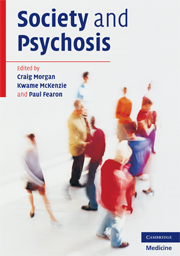Book contents
- Frontmatter
- Contents
- Contributors
- Acknowledgements
- 1 Introduction
- 2 Climate change in psychiatry: periodic fluctuations or terminal trend?
- Part I Theoretical and conceptual foundations
- 3 Social science, psychiatry and psychosis
- 4 Conceptualising the social world
- 5 Genes and the social environment
- Part II Social factors and the onset of psychosis
- Part III Social factors and the outcome of psychosis
- Part IV Models and conclusions
- Index
- References
3 - Social science, psychiatry and psychosis
from Part I - Theoretical and conceptual foundations
Published online by Cambridge University Press: 07 December 2009
- Frontmatter
- Contents
- Contributors
- Acknowledgements
- 1 Introduction
- 2 Climate change in psychiatry: periodic fluctuations or terminal trend?
- Part I Theoretical and conceptual foundations
- 3 Social science, psychiatry and psychosis
- 4 Conceptualising the social world
- 5 Genes and the social environment
- Part II Social factors and the onset of psychosis
- Part III Social factors and the outcome of psychosis
- Part IV Models and conclusions
- Index
- References
Summary
Introduction
The relationship between psychiatry and the social sciences has frequently been antagonistic. A major assumption underpinning psychiatry is that mental illnesses are at root biological and, as such, are primarily the remit of biomedical science. Within this conceptualisation, social science can at best assume a peripheral role, perhaps in helping to understand environmental influences on the presentation and course of the mental illnesses or in explaining patterns of service use (Kleinman, 1991). As for the key issue of aetiology, the biological sciences provide the framework and method for research; with regard to clinical practice, physical medicine offers the template. This is particularly true for schizophrenia and other psychoses, the disorders assumed to be most determined by biology (e.g., Crow, 2007). During the past two decades, the dominance of biological perspectives within psychiatry has increased, fuelled by rapid advances in genetics and the development of increasingly sophisticated techniques for studying the brain, such as functional magnetic resonance imaging. However, somewhat ironically, these advances are generating evidence that social experiences over the life course can affect gene expression and neurodevelopment (e.g., Meaney, 2001; Teicher et al., 2003), and this is fuelling a renewed interest in the potential role of the social environment in the aetiology of schizophrenia and other psychoses (see Chapters 6–10).
The extent to which psychiatry has stood in direct opposition to the social sciences has fluctuated over time, and at any given point there have been proponents of closer collaboration with sociologists and anthropologists (e.g., Cooper, 1992).
Keywords
- Type
- Chapter
- Information
- Society and Psychosis , pp. 25 - 40Publisher: Cambridge University PressPrint publication year: 2008
References
- 3
- Cited by

